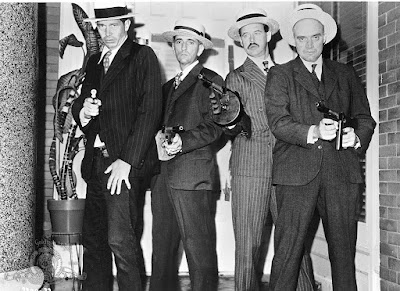Dillinger
Writer & Director – John Milius
1973, USA
Stars – Warren Oates, Ben Johnson, Michelle Phillip, Harry Dean Stanton, Richard Dreyfuss
Tipping its hat gratefully to ‘Bonnie and Clyde’ as it speeds past, John Milius’ ‘Dillinger’ reels headlong into a particular ‘70s style of brutality. From the moment Warren Oates opens with his monologue to those he’s robbing that they treat this moment as something they should treat as a golden moment in their lives to go on to tell, there’s the charm that makes him an anti-hero. This spell is quickly broken when he essentially rapes his soon-to-be-beloved – or maybe they just like it rough with that particularly ‘70s misogyny? Apparently, Milius was the kind of director that took guns on set, but he’s fully aware of the aforementioned conflict: he’s as much enamoured with as appalled by Dillinger: “You’re going to like him, in fact, you’re going to like him a lot, you’re going to wish he doesn’t get filled full of holes – but he still deserves it.”*
Playing fast and loose with the facts of “Public Enemy No. 1”, (for example, apparently Dillinger didn’t pull his gun outside the cinema; see IMDB trivia for starters, etc) and despite it’s more measured tones, the exploitation angle is in no doubt. This is not for historians. Come for the cheap thrills, indulgence in and a little deconstruction of the myth. Dillinger’s crew features Pretty Boy Floyd and Baby Face Nelson, the kind of monikers that would go down in history and influence the nicknaming of criminals to come. The familiar faces in the cast – like Dean Stanton, Dreyfuss and John P. Ryan – help to root narrative, which is always jumping around, a cut-and-paste of vignettes of the gangsters’ career. There’s a lot of potential charisma in the legend but we only see them in sparse midwestern stark rooms and landscapes, and there’s not much glamour here. This may be down to budget, but it’s nevertheless effective.
Dillinger’s crew take on a kind of folk hero status, speeding around in death-trap cars robbing banks during the Great Depression Midwest; Sticking It To The Man. It runs on petrol, limitless bullets and machismo, with a decidedly ‘70s vibe. The FBI agent in pursuit is Melvin Purvis (Ben Johnson), the other protagonist who chomps cigars and has one of his men fit gloves on him before he goes in, guns blazing, in a decidedly feminine dressing-for-show, lady-in-waiting manner. And folk heroes they may become, but Milius doesn’t soft-soap the clumsiness and crudity of the violence, as brutally gun-totingly exciting as it may be, so we are in no doubt these are bad men. "Decent folk don't live that good."
It’s these ambiguous touches, an underlying atmosphere of poverty and a seeming paucity of imagination from the characters spotlighted that means that, however much it enjoys the thrill of violence-action, the film is as much interested in social context. Just throwing up a facsimile makes the point. And however much we might be entertained by Dillinger’s bravado in escaping jail with a fake gun, we are always reminded of his egotism and narcissism. It all reaches a peak with the excellent farmhouse shoot-out set-piece, and it does seem that ‘Dillinger’ is a somewhat under-acknowledged exploitation gem, drenched in Depression-era ambience and a still surprisingly brutal edge.



No comments:
Post a Comment